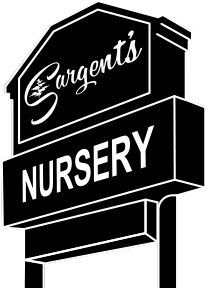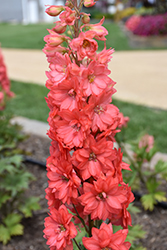Height: 30 inches
Spacing: 12 inches
Sunlight:
![]()
![]()
Hardiness Zone: 5
Brand: Walters Gardens
Description:
A stunning variety featuring excellent uniformity and strong branching; coral-red flowers on tall stems rise just above low growing mounds of deep green foliage; great for fresh cut flower arrangements or adding height to small garden spaces
Ornamental Features
Red Lark Larkspur features bold spikes of coral-pink flowers with red overtones and white eyes rising above the foliage from early to mid summer. The flowers are excellent for cutting. Its deeply cut lobed leaves remain dark green in color throughout the season.
Landscape Attributes
Red Lark Larkspur is an herbaceous perennial with a rigidly upright and towering form. Its relatively fine texture sets it apart from other garden plants with less refined foliage.
This plant will require occasional maintenance and upkeep, and should be cut back in late fall in preparation for winter. It is a good choice for attracting bees, butterflies and hummingbirds to your yard. Gardeners should be aware of the following characteristic(s) that may warrant special consideration;
- Insects
- Disease
Red Lark Larkspur is recommended for the following landscape applications;
- Accent
- Mass Planting
- General Garden Use
- Container Planting
Planting & Growing
Red Lark Larkspur will grow to be about 24 inches tall at maturity, with a spread of 24 inches. When grown in masses or used as a bedding plant, individual plants should be spaced approximately 12 inches apart. It tends to be leggy, with a typical clearance of 1 foot from the ground, and should be underplanted with lower-growing perennials. The flower stalks can be weak and so it may require staking in exposed sites or excessively rich soils. It grows at a medium rate, and under ideal conditions can be expected to live for approximately 10 years. As an herbaceous perennial, this plant will usually die back to the crown each winter, and will regrow from the base each spring. Be careful not to disturb the crown in late winter when it may not be readily seen!
This plant does best in full sun to partial shade. It prefers to grow in average to moist conditions, and shouldn't be allowed to dry out. This plant should not require much in the way of fertilizing once established, although it may appreciate a shot of general-purpose fertilizer from time to time early in the growing season. It is not particular as to soil type or pH. It is somewhat tolerant of urban pollution. This particular variety is an interspecific hybrid. It can be propagated by division; however, as a cultivated variety, be aware that it may be subject to certain restrictions or prohibitions on propagation.
Red Lark Larkspur is a fine choice for the garden, but it is also a good selection for planting in outdoor pots and containers. With its upright habit of growth, it is best suited for use as a 'thriller' in the 'spiller-thriller-filler' container combination; plant it near the center of the pot, surrounded by smaller plants and those that spill over the edges. It is even sizeable enough that it can be grown alone in a suitable container. Note that when growing plants in outdoor containers and baskets, they may require more frequent waterings than they would in the yard or garden. Be aware that in our climate, most plants cannot be expected to survive the winter if left in containers outdoors, and this plant is no exception. Contact our experts for more information on how to protect it over the winter months.
In our experience, this plant is often able to survive in Zone 4 if given additional winter cover and specific cultural care. Please speak with Sargent’s sales staff to learn how to care for this plant.
How can we help?
We encourage you to visit the garden center to explore our full offerings and connect with our team of experts. Our team is on hand to help with any questions you have, and can help you with memorials, deliveries, special orders, and tree planting and more…




